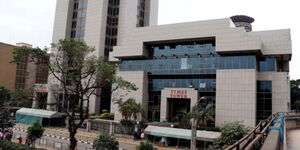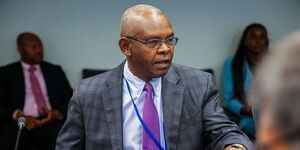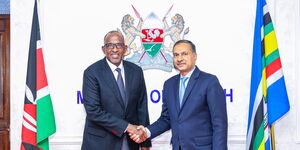Prime Cabinet Secretary Musalia Mudavadi has called for reforms towards public participation, raising concerns over its cost-effectiveness.
During the Regional Ministerial roundtable session on Open Government Partnership, Mudavadi cited the high cost of public participation, which is a constitutional requirement, noting that more could be done to reduce its high costs.
While linking its high costs to those of pertinent government projects, Mudavadi urged a rethink of the framework around public participation while acknowledging its importance to the legislation and development process.
“In Kenya, the whole issue of being open is now a Constitutional requirement. We can not undertake any piece of legislation, we cannot push any policy position, we can not even take up a development program without public participation,” Mudavadi stated.
Currently, there are over 700 policy legislations with the lowest cost estimated at Ksh10 million. This brings the approximate total cost of public participation in Kenya to about seven billion.
“I know democracy is expensive and it is the best mode. But you tell me, if public participation is going to cost a government, at the lowest, something like seven billion. How do you reconcile this between doing public participation and supplying drugs to hospitals? How do you reconcile between building a bridge or a hospital and doing public participation?” Mudavadi posited.
“So in the whole framework of open government, we are now faced with a situation where the principle is correct, but did we factor in the cost?” he added.
In Kenya, public participation is entrenched in Article 10 and Article 232 of the Constitution of Kenya, 2010, and further elaborated in various laws and policies.
It is carried out through various channels that include public forums and barazas, stakeholder consultations, written submissions, petitions, social media and online platforms as well as citizen service charters.
Key areas covered by public participation are legislation and policy making, budgeting and public finance management, development planning and environment and land management.
In Kenya, public participation has generated debates with the general public discourse on the subject often polarized, reflecting both optimism and frustration. While it is seen as an essential tool for inclusive decision-making, concerns persist over its implementation, effectiveness, and political manipulation.
For instance, a key topic of discussion on the issue has been the division between public participation as a constitutional right versus it being a mere formality. The general consensus is that public participation is a progressive constitutional requirement, allowing citizens to influence laws, policies, and development projects. However, critics argue that many public forums are mere formalities, conducted to meet legal requirements rather than to genuinely incorporate public input.
Other areas of concern include accessibility and inclusivity, the balance between quality and quantity in public participation, political interference and manipulation, weak feedback mechanisms and implementation gaps, as well as the emerging role of technology and social media.












